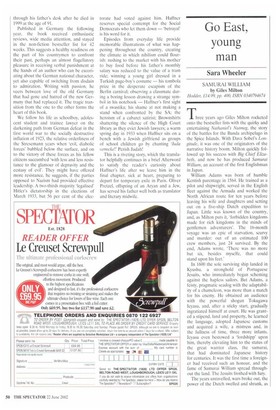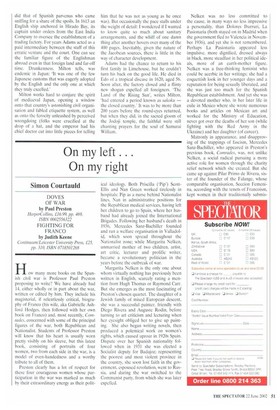Go East, young man
Sara Wheeler
SAMURAI WILLIAM by Giles Milton Hodder, £14.99, pp. 400, ISBN 0340794674 Three years ago Giles Milton rocketed onto the bestseller lists with the quirky and entertaining Nathaniel's Nutmeg, the story of the battles for the Banda archipelago in the Spice Islands. With Dava Sobel's Longitude, it was one of the originators of the narrative history boom. Milton quickly followed up his success with Big Chief Elizabeth, and now he has produced Samurai William, an account of the first Englishman in Japan.
William Adams was born of humble Kentish parentage in 1564. He trained as a pilot and shipwright, served in the English fleet against the Armada and worked the North African route for ten years before leaving his wife and daughters and setting out on a five-ship Dutch expedition to Japan. Little was known of the country, and, as Milton puts it, 'forbidden kingdoms made for rich kingdoms in the minds of gentlemen adventurers', The 16-month voyage was an epic of starvation, scurvy and murder: out of an estimated 100 crew members, just 24 survived. By the end, Adams wrote, 'There was no more but six, besides myselfe, that could stand upon his feet.'
In 1600 the sole surviving ship landed in Kyushu, a stronghold of Portuguese Jesuits, who immediately began scheming against the hapless sailors. But Adams, a feisty, pragmatic seadog with the adaptability of a chameleon, was more than a match for his enemy. He obtained an audience with the powerful shogun Tokugawa Ieyasu, and, after a sticky start, gradually ingratiated himself at court. He was granted a stipend, land and property, he learned the language, adopted Japanese customs and acquired a wife, a mistress and, in the fullness of time, three more infants. Ieyasu even bestowed a `lordshipp' upon him, thereby elevating him to the status of the great warrior class, the samurai, that had dominated Japanese history for centuries. It was the first time a foreigner had received such an honour, and the fame of Samurai William spread throughout the land, The Jesuits frothed with fury.
The years unravelled, wars broke out, the power of the Dutch swelled and shrank, as did that of Spanish parvenus who came sniffing for a share of the spoils. In 1613 an English ship anchored in Hirado Bay, its captain under orders from the East India Company to oversee the establishment of a trading factory. For years Adams acted as a paid intermediary between the staff of this erratic venture and the court. One can see the familiar figure of the Englishman abroad even in that foreign land and far-off time. Drunkenness, Milton tells, was endemic in Japan: 'It was one of the few Japanese customs that was eagerly adopted by the English and the only one at which they truly excelled.'
Milton works hard to conjure the spirit of mediaeval Japan, opening a window onto that country's astonishing civil organisation and fabled etiquette system, as well as onto the ferocity unleashed by perceived wrongdoing (folks were crucified at the drop of a hat, and the emperor had his chief doctor cut into little pieces for telling him that he was not as young as he once was). But occasionally the pace stalls under the weight of detail: I wondered if I wanted to know quite so much about sanitary arrangements, and the whiff of one damn thing after another hovers over many of the 400 pages. Inevitably, given the nature of the Jacobean sources, there is little in the way of character development.
Adams had the chance to return to his first family in Limehouse, but he couldn't turn his back on the good life. He died in Edo of a tropical disease in 1620, aged 56. Soon after, the factory closed and a flinty new shogun expelled all foreigners. 'The Land of the Rising Sun', writes Milton, tad entered a period known as sakoku — the closed country.' It was to be more than 200 years before the round-eyes returned, but when they did, in the sacred gloom of the Jodoji temple, the faithful were still chanting prayers for the soul of Samurai William.











































































 Previous page
Previous page